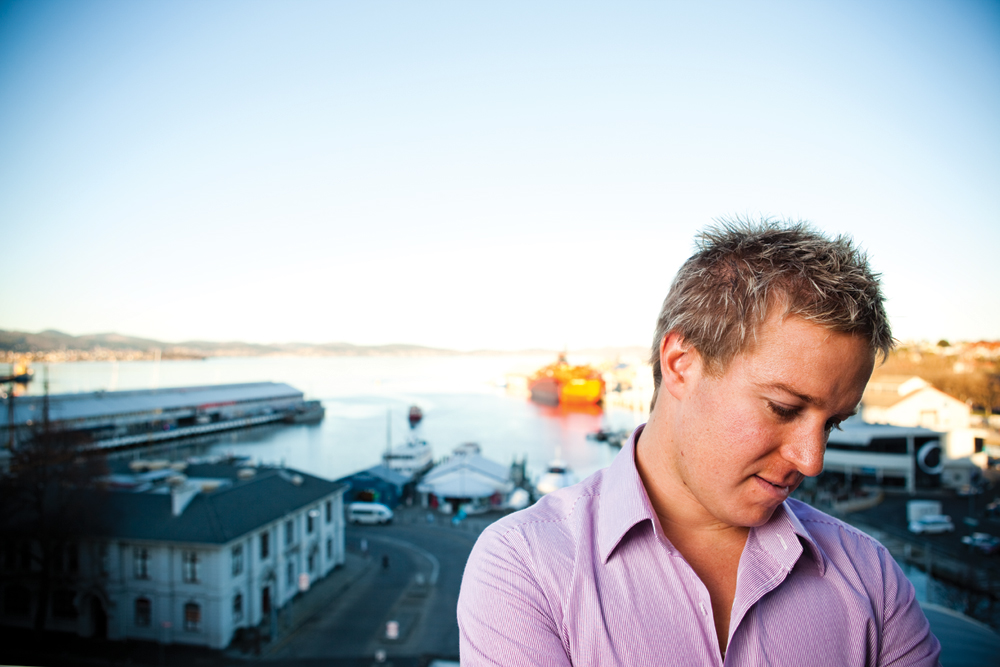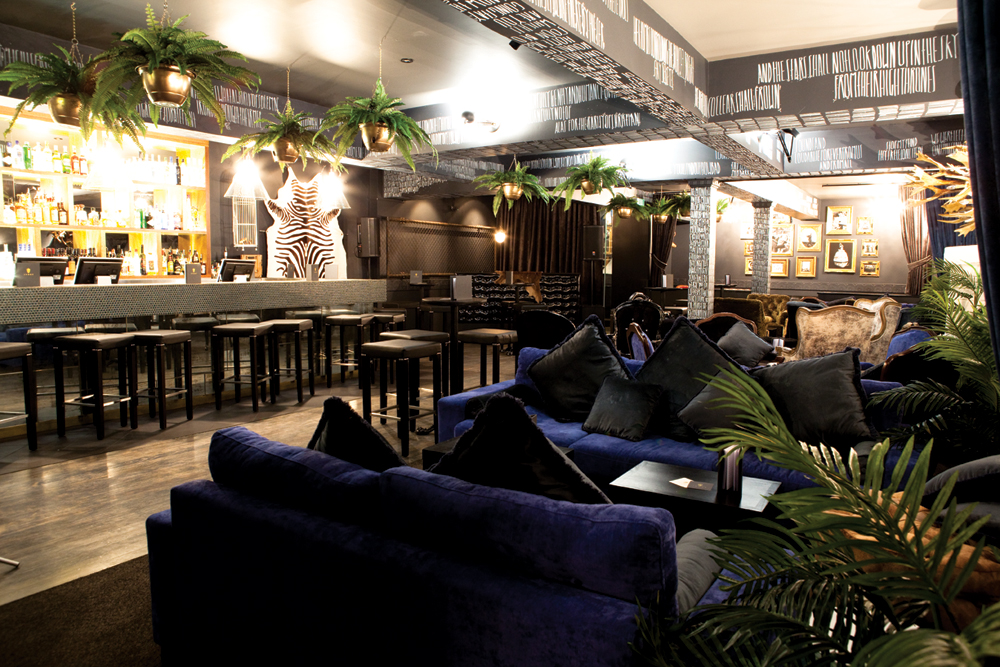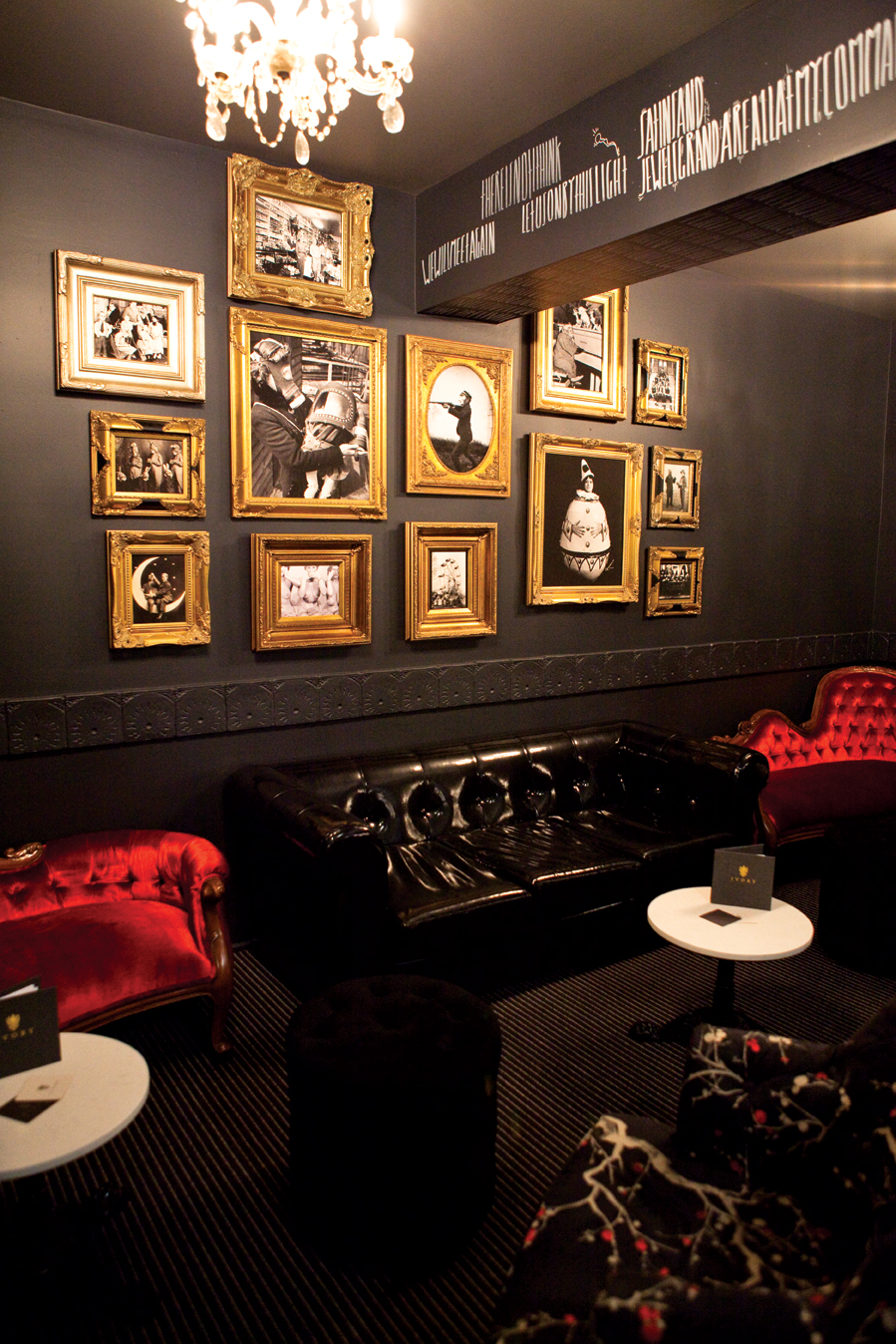David Hales
 The sleepy city of Hobart has woken up to an invasion from within. Local upstart David Hales has unleashed four venues in the last three years and taken control of a big chunk of the city’s nightlife. venue journeyed south to see how the campaign is faring.
The sleepy city of Hobart has woken up to an invasion from within. Local upstart David Hales has unleashed four venues in the last three years and taken control of a big chunk of the city’s nightlife. venue journeyed south to see how the campaign is faring.
Photo: Corey Sleap
It’s success by annihilation down at the beardy end of Australia. And for now David Hales reigns supreme. He’s held court of Hobart’s nightlife for going on three years now and a worthy contender has yet to surface. Which means we can safely break out the anointing oil and hoist the crown upon his spiky blond dome with little more fuss than a few spilt drinks.
Hales has four venues in Hobart: Observatory, the waterside club for youngsters; the Telegraph, an old-school pub refashioned for the uni crowd; Cargo Pizza Restaurant & Bar, his food presence in the Salamanca Place dining precinct; and Ivory, his recently renovated basement lounge club. They’re all within walking distance and in fact three are within a stone’s throw of each other. It might not sound as widespread or extravagant as the likes of the Hemmes empire, but this is Hobart, not Sydney. And for a state capital, Hobart isn’t exactly a thriving metropolis. It’s right down the bottom of the list as far as population numbers go, just pipping Darwin with a little over 200,000 in the greater Hobart area and a lot less than half of those actually in the city of Hobart. It puts it more on par with regional centres and requires a touch of the small-town mentality.
It’s not about niche marketing in Hobart — if you can’t market to the masses, you’re just a small fry in a small town. And with such a small population, operating four successful venues is tantamount to dividing and conquering. All hail King Hales!
TAKING THE PUNT
Hobart is a fishing town. Each morning the trawlers crawl out from the dock at the mouth of the Derwent River and return with their fresh ocean bounty. Tethered to Franklin Wharf’s Constitution Dock, near the river mouth, floats Mako Seafood’s double-storey pontoon fish punt. At 18, Hales was working up top in the fish and chippery and saving up to buy it, but when he finally saved up half of the $30,000 he needed, he took a punt on the fresh fish business underneath instead.
It was his first business and it was going cheap because it wasn’t doing so well. “[The business] was struggling because everyone used to always go to the other shop directly opposite. And we’d always think, why? But it was because they gave good service and a good product. I just focused on that, and eventually we went past them.” As the modest conqueror puts it. But really, by the time Hales retired from the fresh fish business he had two fish punts, his and his competitors. If you can beat them, why not conquer them. It’s the Hobart way.
When Hales tired of reeking of fish, he got out of the business and landed himself a Greek supermarket that was looking a little tired. Hales cleaned the place up and instead of tempting fate with more fish & chips he wisely turned it into a gourmet supermarket (Salad Bowl). “It was a bit of a big bite,” said Hales, “because again I didn’t know anything about supermarkets. It was a lot of money for a 22-year old. But I just took the punt. It already had a lot of customers coming in there, but the dollar spend was just so minimal, because it was tired. My grandfather said he wouldn’t buy a can of Pal there. I wanted to put in fish and chips, because I knew it, and there were a lot of people going through the shop. I wasn’t worried about the image; I was more worried about theinvestment. But when I got up there, the concept changed. I knew you couldn’t mix fish and chips with fresh produce, so we went down the gourmet side of things. That was a good business, I loved it.”
A while later, some friends offered him ridiculous money to take the business off his hands. Well, he sold it with a clause to settle in two years, which gave him a capital gains tax problem that was somehow missed. On discovering the oversight David was delivered the edict to ‘spend up big or you’re going to have to pay up’. Well, he always intended to move into property development, and with the grocery business over shortly, he needed someplace that would produce a little cash flow. So he headed back to the water and put down a chunk of money on the double-storey building that still houses his first club, Observatory.
BIGGER BITE
It’s here that I must let you in on something. David Hales isn’t a born operator. He hasn’t climbed the ranks of dish pig, turned barman, to manager with a stake in the business, before eventually owning his own place. Before he opened Observatory, he’d never even pulled a beer! [And he still hasn’t — Ed] Likewise he’d never dealt in gourmet foods before that or run a fresh fish business before buying one. But by heck he works harder than most — arguably more than anyone else in his hometown — and loves the buzz of fast-paced retail. David Hales is first and foremost a businessman, entrepreneur… whatever you’d like to call him. At the moment he’s in the hospitality biz, but come tomorrow he could have his face on a range of salad dressings. The interesting part is not that he got involved in the hospitality business, but that he chose to get so involved. He does have a few other businesses up his sleeve, in all of which he’s taken more of the silent partner route. So it’s bemusing to see him work his guts out in hospitality, and wonder, why?
“I never meant to get into hospitality like this.” Says Hales. “I only wanted to do Observatory. One, for a bit of cash flow because I’d got out of the shop, but mainly for a bit of fun really. I wanted to just do a nightclub and move on. I never came to spend my life down here.”
The thing is, for all his good intentions of merely dabbling in hospitality, as always David ended up biting off a little more than he could chew. Suffice it to say, within 18 months David wasn’t in possession of just one hospitality lease, but four!
“I bought Cargo, which was a souvlaki joint. I wanted to do a pizza concept because I knew there were 10,000 people down here on a Saturday and no food. All the takeaway joints were 2k’s away and killing it. The end result was a bit more refined though. A month before I opened Observatory in August 2007, the Telegraph came on the market. The owner was talking to other parties. I rang him up, got him to come to the offices down the road and did a deal on the spot, shook hands and that was that. Before I actually opened, I already had three. This was before I’d ever poured a beer or worked in a bar or anything. There used to be another nightclub which used to be where Ivory is, which we bought out in September 2008. And we opened Cargo in January 2009. That was all in 18 months, and we haven’t done a lot since then. Basically we just got too big too quickly… not to mention the headaches.”
YOU NEED HELP
When David started out, he didn’t know the first thing about how to run a club. “It was more of a business thing. It was probably a bit ballsy in some respects, because I didn’t do any research on it, and I didn’t know the first thing about nightclubs. All I knew was that decent venues were lacking in Hobart. It’s where I saw the gap. If you do it properly, they will come.”
Like any businessman worth his salt, David surrounded himself with people in the know. He called in some outside help — Sydney designer Paul Kelly — to bring a metropolitan touch to the Hobart establishments. “In the end I threw everything at [Observatory], and people thought I was mad, spending millions on a fitout, because no one had done it in Hobart. A couple of people have done refits, but not to that extent, I suppose.”
Thankfully, it did well, and highlighted the fragility of the Hobart set’s allegiance. “We opened in Winter and took a fair market share, because it’s such a big venue. That’s how full-on the market is. That’s why we’ve bought some of the sites, because if we don’t, someone else will.”
TIGHT SHIP
The ‘build it and they will come’ ethos only goes so far. After a while though, customers are bound to tire of the building and stop coming, which would signal disaster for a heavily invested owner in a low-population area. But David said it’s about doing the whole business properly, not just the building.
The 31-year-old runs a relatively tight ship. At the top of the tree is Hales followed closely by his two trusty earls of the court — Ian, his 40-year old GM, and Damian, the operations manager. Then there’s the accountant, and his mum, who handles the day-to-day, on-the-ground finances. With well over 100 staff filling out the tiers of the business, it’s a lot to manage for the small group. On an average weekend night you’d find Ian on the door running security at Observatory and Damian flitting between the other three venues to keep an eye on them.
David is no different. Eating dinner with him at Cargo is like trying to hold the attention of a teenager who can’t keep his eyes off a girl across the room, except the ‘girl’ is Cargo. It’s total OCD stuff, whether it’s hawk eye-ing his staff going about their business, or smoothing his hands along the bar and grimacing over the amount of polish eaten away by booze. Even his friends won’t go to Cargo with him, he says as he stares over my shoulder. He just can’t help himself. After dinner, and a quick detour to Ivory, we end up at his usual haunt, Observatory, where David heads upstairs and immediately starts doing the rounds.
“You need one of us downstairs and one of us up,” explains David. “It’s a nightclub full of high maintenance kids. That’s the business. People interpret it as some sort of glamorous lifestyle, but it’s not. Far from it. On a Saturday night we can have 2,000 people come through, and we’ll probably have 25 security across the venues. The fact that I’m there, Damian, and Vaugny [Ian] is there flows on. A lot of people have issues with security, whereas we don’t. If you f**k up, you’re out. I don’t care who you are.”
ON THE GROUND
David talks a lot about being ‘on the ground’. It’s why you’ll find him out every weekend with thousands of teenagers instead of his girlfriend, and plays therapist to their personal dramas. It all sounds a bit tedious for a 31-year old, and definitely for Ian, a 40-year old with kids. But the small town mentality prevails, and that lead-by-example, on-the-front-lines attitude is what he sees as the determining factor between success and the whole empire caving in on his head.
“If you wanted to run it like a lot of people run business, and not really give a stuff, then it’s fine. But it’s not how we operate; we try operate 110 percent seven days. Also the market’s so small, if you don’t run it at that level, that’s when you could come into trouble with other operators coming in. That’s probably why we’ve done reasonably well, because we are on the ground 24/7. I’m 31, but I know what the kids and adults want. My two guys sit in the office during the week, but then they’re there at night. We know the majority of the customers. The difference with a lot of other operators is they’re not hands on. That was probably okay before, because there wasn’t that many licenses and you didn’t need to spend money on their venues a few years ago. We got Paul on board, and things have changed. Now it’s a lot more competitive.”
As admirable as it is to see a king charge into battle on the front line, it also seems impossible to maintain as anything more than a token demonstration of commitment to the cause. That’s what generals are for, and the colonels and majors below them. It’s hierarchy for the sake of sustainability. If one drops dead, the whole army doesn’t collapse. But instead, David has taken the reins himself. There are 135 employees pouring drinks and carrying out plates of food, and only five people running the company side of things.
There’s no mid-tier management, just venue supervisors. Everything down to the poster graphics is centrally managed, even his mum counts the tills at the end of the day. And it’s not without trying, David assures me. “The gates are open,” he’s told them, “we want to expand, and if you want to be a part of it, you can be rewarded.” He struggles to find people to fill senior management roles, because people just aren’t choosing hospitality as a career.
DREAM ON
And there’s the rub. In a city with a small-town mentality there’s no culture of ascendancy. Few dare to dream. And when all the potential candidates to carry on the legacy have grown up around venues where only a few exemplified the finer points of hospitality, there’s little to build their dreams on. So even as David forges a new path for Hobart’s hospitality scene, he needs to inspire an army of career-minded hospitality young guns if he’s to have his legacy.
And it’s the legacy that troubles David. More so the legacy it will leave on his own life rather than Hobart’s. He’s always come in at the bottom, and built up from there. It’s his MO. He did it with the fish punt and has managed to replicate his success with hard work and vision many times over. But it was never his intention to get ‘stuck’, so to speak. “I’ve always had the philosophy of buying struggling businesses, or alternatively starting new ones at the bottom, and building them up, and then moving on. I enjoy that challenge, and I’m not really interested in going to work for the next 20 years doing [the same thing]. Otherwise I’m not going to grow personally.”
But the long and short of it is, like any business, there’s big money involved. And I’m not talking about cash cow money. It’s there, but the idea of milking an established empire doesn’t interest David. I’m talking about the investment, the amount of money and risk associated with opening and running four venues in three years. “The outlay is millions of dollars, it’s too big to sit back, and bark orders,” he says. Which is the other reason David is so involved. For now, he can’t get out. And until it either kills him, or someone takes him over, there’s no rest for Hales. — Mark Davie


